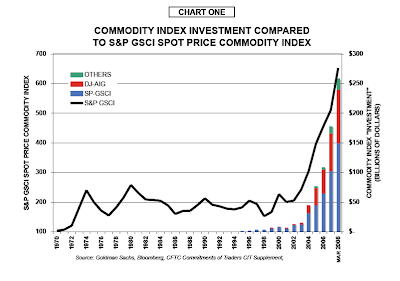Here’s Mish‘s take on
Commodities Speculation Symptom Of Larger Problem
Definitely worth reading….
With a tip of the hat to Michael Masters, it is possible to Quantify Commodities Speculation. Here is the key chart:
Commodity Index Investment vs. Spot Prices

Chart One shows Assets allocated to commodity index trading strategies have risen from $13 billion at the end of 2003 to $260 billion as of March 2008, and the prices of the 25 commodities that compose these indices have risen by an average of 183% in those five years!
What To Do About It?
If speculation is the problem, then the question is what to do about it. Masters proposes three solutions as follows:
Number One:
Congress has closely regulated pension funds, recognizing that they serve a public purpose. Congress should modify ERISA regulations to prohibit commodity index replication strategies as unsuitable pension investments because of the damage that they do to the commodities futures markets and to Americans as a whole.
Number Two:
Congress should act immediately to close the Swaps Loophole. Speculative position limits must “look-through” the swaps transaction to the ultimate counterparty and hold that counterparty to the speculative position limits. This would curtail Index Speculation and it would force ALL Speculators to face position limits.
Number Three:
Congress should further compel the CFTC to reclassify all the positions in the Commercial category of the Commitments of Traders Reports to distinguish those positions that are controlled by “Bona Fide” Physical Hedgers from those controlled by Wall Street banks. The positions of Wall Street banks should be further broken down based on their OTC swaps counter-party into “Bona Fide” Physical Hedgers and Speculators.
The problem with Masters’ solution is that commodity speculation is "A" problem, not "THE" problem. A still better way of looking at it is that commodities speculation is symptom of a much larger set of problems:
- Fractional Reserve Lending
- Past monetary inflation
- The Fed’s willingness to blow bubble after bubble
- Loose lending standards by the Fed
- Carry trades in Japan
- Runaway spending by Congress
All of the above points pertain to other central bankers and foreign governments as well.
The Fed openly encouraged speculation in the wake of the dotcom crash. Greenspan was the biggest cheerleader for both derivatives and ARMs. The result was the biggest housing bubble the world has ever seen.
Although monetary inflation is benign now, the passthrough effects of past monetary inflation are still being felt.
The Fed’s Role
The Fed can provide liquidity but not capital. That is a given. If you disagree, please see No Helicopter Drop For Failed Banks. More importantly, the Fed can only provide liquidity, it cannot dictate where the money goes, if indeed it goes anywhere at all.
 If the Fed steps on the gas once again (monetary printing), it is highly doubtful that money finds its way into job creation or a recreation of the housing bubble (two places the Fed arguably would like it to go). Past experience shows that bursting bubbles do not get reinflated, and given there is rampant overcapacity in practically everything, liquidity is unlikely to foster job creation.
If the Fed steps on the gas once again (monetary printing), it is highly doubtful that money finds its way into job creation or a recreation of the housing bubble (two places the Fed arguably would like it to go). Past experience shows that bursting bubbles do not get reinflated, and given there is rampant overcapacity in practically everything, liquidity is unlikely to foster job creation.
Instead the money will look for a new home, and that home may be the last place the Fed wants it to go: continued commodity speculation. Congress could intervene, but that will not address the root problem: Fractional Reserve Lending and the Fed itself.
By the way, if Congress does intervene, it does not guarantee that speculation in commodities will end, it might merely shift futures trading from one market to another.
Dubai Futures launch
Please consider Oil’s tense trading scene may sway a move to Dubai.
A U.S. Senate panel listened to testimony on May 20 that said financial speculation by institutional investors and hedge funds in the commodity markets are contributing to energy and food inflation.
"The regulatory environment is becoming so undesirable to foreign and domestic funds that they have no choice but to go offshore," said Kevin Kerr, president of Kerr Trading International and editor of MarketWatch’s Global Resources Trader.
"If Congress makes some laws that reign in speculation, it’s possible that speculators will move out of the U.S. markets and into Dubai," said Phil Flynn, a vice president at Alaron Trading.
"Understaffed and overworked, the regulatory industry has decided to throw the baby out with the bathwater and meanwhile, legislators who are also fearing job loss have decided to blame the speculators and create some sort of witch hunt," said Kerr.
"Dubai is now the Middle East’s recognized financial services hub and in a short period of time, has gained a solid reputation as a good place to do business and invest," said Mark O’Byrne, a director at Gold and Silver Investments Ltd. in Dublin, Ireland.
Gold futures have been traded on the DGCX since the exchange’s inception. The launch of those contracts may have had a "marginal impact" on trading volumes on the Nymex/Comex, said O’Byrne.
"This is likely to be the case with an oil exchange in Dubai," especially if there is a "misguided attempt to regulate ‘speculators’ in Nymex and Comex," he said.
Congress cannot fix this problem by passing laws against speculation or by Insanity: Sue OPEC over Oil Prices.
Speculation will continue as long as conditions exist that foster speculation and/or until the whole mess blows sky high on some derivatives chain failure. The latter is increasingly likely. Timing it is of course the problem.



